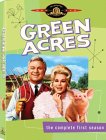| Reviews & Columns |
|
Reviews DVD TV on DVD Blu-ray 4K UHD International DVDs In Theaters Reviews by Studio Video Games Features Collector Series DVDs Easter Egg Database Interviews DVD Talk Radio Feature Articles Columns Anime Talk DVD Savant Horror DVDs The M.O.D. Squad Art House HD Talk Silent DVD
|
DVD Talk Forum |
|
|
| Resources |
|
DVD Price Search Customer Service #'s RCE Info Links |
|
Columns
|
|
|
Green Acres - The Complete First Season
The show's premise is simple enough and, possibly unique in TV Land, was carefully stretched over much of its first season and its characters introduced over two separate shows. Longing to live on a farm and work the land, Oliver buys a small farm and with glamorous Hungarian wife Lisa (Eva Gabor), they abandon their luxurious Park Avenue penthouse for rustic life in Hooterville. They buy a dilapidated shack from unrepentant shyster Mr. Haney (Pat Buttram), a home literally falling apart and without electricity, a telephone, or running water. Lisa is appalled and tries to convince Oliver to move back to the city, but he is undeterred.
The Douglas's story originally unfolded on both this show and the far more conventional but very popular Petticoat Junction, then in its third season. Albert and Gabor made appearances on that show, while its stars appeared on theirs. This cleverly assured Green Acres' success, giving its characters exposure not once but twice for seven of its first ten weeks on the air. (Interestingly, these early shows are also generally done in "real time," with stories set about week apart, a device common today but rare in 1965.) The Petticoat Junction shows aren't included, but don't impact Green Acres' main story threads, though there are references to plot elements from the other show.
Most of these early episodes, unlike the rest of the series, are built upon Oliver's unshakable optimism, with Lisa begging him to move back to New York, and Hooterville's characters bemused by Oliver's intentions and lionization of the American farmer. However, soon enough writers Jay Sommers (who created and produced the show) and Dick Chevillat realized the show's full potential by making Oliver essentially the straight man not only to ditzy Lisa's malapropisms but also to Hooterville's consistently peculiar residents. The show's Mr. Haney proved the perfect showcase for Buttram, whose genially wheezy Alabama accent and wall-eyed sincerity made him the perfect shyster against Albert's reluctant, short-fused customer. (Executive producer Paul Henning must have been a big Gene Autry fan. Buttram was Autry's sidekick on TV while the famous cowboy's first sidekick, Smiley Burnette, spent his last days as a regular on Petticoat Junction.)
Equally amusing is Eb (Tom Lester), the Douglas's unshakably cheerful hired hand with an ever-present chipmunk smile. His wide-eyed innocence may or may not be a put on; his "golly, gee!" dialogue suggests a bumpkin Jimmy Olson, but there is a very strong suggestion that perhaps he's not nearly as dense as he might first appear. As with all of Hooterville's crazy residents, there is certainly the suggestion that Eb takes an almost sadistic pleasure in watching Oliver become increasingly frustrated, that they're the ones playing Oliver for a fool.
Eva Gabor, quite unlike her famous-because-she's-famous sister Zsa Zsa, had real talent as a comedienne, and is quite adorable here. But it's Eddie Albert, with Sommers and Chevillat's sharp wit, that really makes the show as funny as it is. Like Jack Benny, he gives even the show's most minor supporting characters plenty of room to be funny, realizing that it's his exasperated reactions that make their goofy characters pay off.
Sommers and Chevillat didn't have much a career before or after Green Acres (they had partnered on TV's The Adventures of Ozzie & Harriet and later on the 1995 feature Gordy) but were practically geniuses creating and writing this consistently funny show.
Video & Audio
The nearly 40-year-old Green Acres looks pretty good for its age and considering the years of printing for its almost constant syndication. A few shows aren't as pristine as the others; the fourth episode for instance, "The Best Laid Plans," is unusually grainy with ugly color, though most episodes look fine. It doesn't matter much, actually. Few shows were as cheap looking as Green Acres, what with its singularly phony painted backdrops that somehow added to its almost vaudevillian atmosphere. The mono sound is fine, with Vic Mizzy's famous title song coming through in all its kazoo/electric guitar/xylophone-filled glory. Thirty-two episodes are spread over four sides, and there are no extras or subtitles, though the program is close-captioned. The packaging is attractive yet durable, in the same style as MGM's The Best of Mister Ed, and a bargain at $30, less than $1 per episode.
This has been a Filmways Presentation, dahling.
Green Acres - The Complete Second Season followed in March 2005.
Stuart Galbraith IV is a Los Angeles and Kyoto-based film historian whose work includes The Emperor and the Wolf -- The Lives and Films of Akira Kurosawa and Toshiro Mifune. He is presently writing a new book on Japanese cinema for Taschen.
|
| Popular Reviews |
| Sponsored Links |
|
|
| Sponsored Links |
|
|
| Release List | Reviews | Shop | Newsletter | Forum | DVD Giveaways | Blu-Ray | Advertise |
|
Copyright 2024 DVDTalk.com All Rights Reserved. Legal Info, Privacy Policy, Terms of Use,
Manage Preferences,
Your Privacy Choices | |||||||














